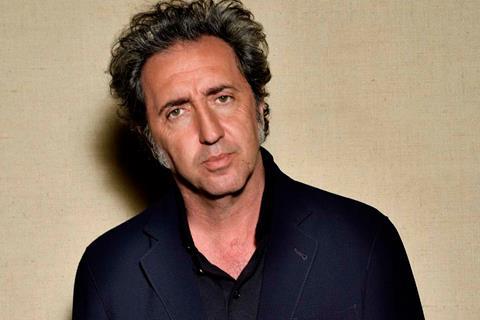
Paolo Sorrentino said there is nothing films can do to affect what he described as a “genocide” in Gaza.
“No film can prevent these kind of things,” said Sorrentino, in response to an audience question about his thoughts on what the questioner described as “the role of films and audience in solving genocide” in relation to the situation in Gaza.
“I’m not able to talk about this because I have no authority and can only use the common things that can be said for this kind of situation,” said Sorrentino. “Movies are not able to have such a profound impact on things that are happening in this moment. I’m sorry, but that is the case. My opinion is very banal. Simply, I agree with all those who say there is a genocide happening in Gaza.”
Both the question and Sorrentino’s response were met with applause in the Bosnian Cultural Center venue, which sold out its 854-seat capacity for the Italian director’s talk.
Sorrentino’s new film Grace (Italian title: La Grazia) will open Venice Film Festival on Wednesday, August 27. Mubi holds distribution rights for 10 territories including the US, and UK-Ireland; the company’s CEO Efe Cakarel issued a statement this week in response to criticism of Mubi’s funding from Sequoia Capital, an investment firm with links to Israeli defence technology.
Sorrentino is receiving an honorary Heart of Sarajevo award at the Bosnian festival.
Disney over violence
Sorrentino requested that his 90-minute masterclass session use an open format, with only a handful of questions from moderator, Serbian director Ognjen Glavonic, before over an hour of audience questions.
When asked about violent scenes in films, Sorrentino said that while he personally likes them, with Martin Scorsese as one of his favourite directors, he doesn’t include them in his films – “it’s very tiring to shoot violent scenes. Mostly I’m too lazy.”
“Another reason I don’t put violence in is I don’t like when a character suffers too much,” said Sorrentino. “I like more Disney movies where everything is good. I never put characters in a condition where life is so desperate; it’s a little bit desperate but not too much, and violence brings a big desperation.”
The director said he will continue to work from his own scripts instead of adapting the work of others. “I tried many times to read scripts of other people, but in 20 years, at the end I always said no,” said Sorrentino. “I’m not able to understand what’s written in a script if the writer is another person. I understand only the things I write. When I do commercials, I ask to write the commercial, otherwise I’m not able to work.”
He detailed his streamlined relationship with his key cinematographers, Daria D’Antonio – who has shot his last three films including Grace – and Luca Bigazzi, who shot all eight of his prior features apart from Sorrentino’s 2001 debut One Man Up.
“I say my feelings about the movie, then they decide what to do,” said Sorrentino. “I describe the character, the movie, what I am looking for. Then they are so smart to realise something that’s good for me. It’s a 10-minute conversation.”
Asked about which actors he would like to work with in future, Sorrentino responded wryly, “There are many actors and actresses I would like to work with. But the optimum would be a movie without actors and actresses.”
The director repeatedly reiterated his love for late Argentinian footballer Diego Maradona, and Sorrentino’s local football team Napoli; and said that “movies saved my sad life. Whenever I’m too sad, I know it’s time to do a movie.”
He also opined that the customary two-hour runtime of many feature films “is something that doesn’t work so well.”
“It’s a bit wrong,” said Sorrentino. “Like songs that are two minutes. Songs must last three minutes. Or 11.”
His most recent feature Parthenope, about the youth of a woman born in the sea in Naples in 1950, debuted in Competition at Cannes 2024. “Too many people are obsessed to find the differences between women and men [these days],” said Sorrentino when asked about having a female protagonist. “I’m more interested in knowing what I have in common with a woman – for me this is the movie.”
Sarajevo’s masterclass programme continues tomorrow (Monday, August 18) with Michel Franco, whose film Dreams screens at the festival.


